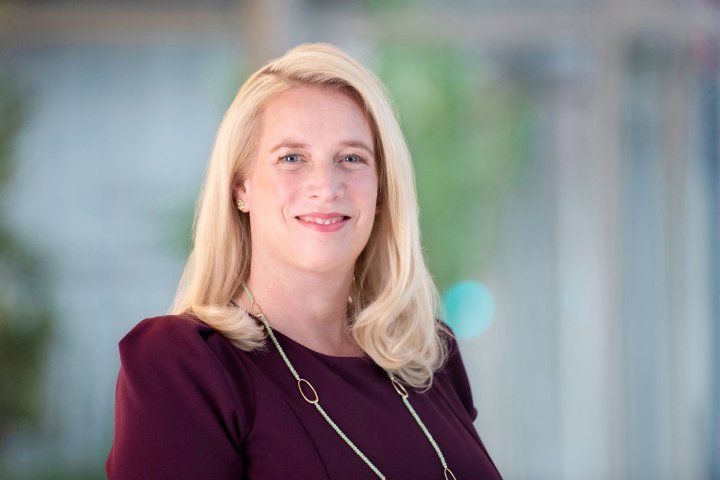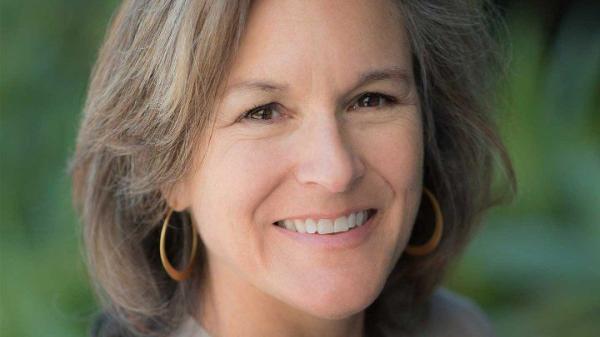Oakland Native has Range of Experience, From Higher Education to Consumer Banking

Erin Gore, MPA, a seasoned executive with strong ties to higher education, is joining UC San Francisco as senior vice chancellor of Finance and Administration – and says she’s thrilled to come aboard at a time when efforts to tackle disparities in access and care are accelerating.
“I’ve had a few personal experiences lately, as well as the shared experience of COVID, that really highlighted for me the differences in care our community members experience,” Gore said. “I see how UCSF is working to break down barriers, and I’m excited to be a part of it.”
Gore most recently served as executive vice president of Growth Initiatives, Strategy, & Communication at Wells Fargo, where she led brand campaigns and COVID crisis coordination, all while significantly reducing operating expenses. Prior to that position, Gore was the director of the Higher Education and Not for Profit division at Wells Fargo.
Throughout her career, Gore has helped usher in and implement large-scale changes in administration, technology, finance and staffing for employers as diverse as UC Berkeley, the City of New York and Bank of America. Working for a diverse slate of employers “taught me how to integrate lots of different perspectives when solving problems,” Gore said. “I like to figure out the biggest solution in a way that breaks down silos and solves for issues in multiple areas.”
Indeed, Gore has received kudos and awards from past employers for her transparent communication and inclusive leadership style, noted UCSF Chancellor Sam Hawgood, MBBS. “Erin’s leadership record of working collaboratively on innovative solutions – across academic, government and private business settings – will serve us well across the multiple dimensions of the UCSF enterprise.”
In her role at UCSF, Gore will refine a budget process and systems for longer-term financial planning and effective operational management at all levels. She will identify and evaluate potential investments and revenue opportunities, and increase the transparency of communication around budgeting and fiscal management.
“Erin has demonstrated an impressive capacity for strategic, big-picture thinking, systems refinement, and relationship-building through open communication,” said Dan Lowenstein, MD, UCSF executive vice chancellor and provost. “Her combination of skills is a great fit for the complex community that is UCSF.”
Connected to Higher Education
Gore is no stranger to the UC system, having served as UC Berkeley’s associate vice chancellor of Planning and Budget and chief financial officer from 2009-2014. Soon after joining, she said she was shocked to discover there was no campus-wide budget plan, and quickly worked to create UC Berkeley’s first. She also oversaw major building redevelopment projects, as well as new efforts to simplify financial aid processes, create data systems, and increase aid for first-generation students.
“My time at Berkeley is definitely a career highlight,” Gore said. “I came to the role viewing myself as a numbers person, but I fell in love with the students and really enjoyed working with them. Those personal connections made all parts of my job meaningful.”
When she moved to Wells Fargo’s higher education arm, Gore drew on her experience at UC Berkeley to help colleges and universities reduce their overhead and expand fiscal capacity through low-cost financing and technological efficiencies. She stayed involved with the academic sector in her spare time by serving for six years as a public commissioner for the Western Association of Schools and Colleges (WASC) accreditation board.
“As a commissioner at WASC, I focused on how universities used their funding to support institutional goals, including diversity, equity and inclusion,” Gore said. “I still volunteer there.”
Gore also volunteers as an advisory board member for the New York Pops, which has a robust musical education program, and serves as a board director for the University of California System Captive Insurance Company.
A Call to Health, and UCSF
Personal experiences in the last several years drew Gore toward an interest in working in health sciences and care, and ultimately, to UCSF itself.
When a 3-year-old loved one in L.A. was diagnosed with childhood cancer, Gore saw firsthand how much the quality of care differed based on where the child received treatment. Then in 2020 and 2021, her husband suffered health issues involving multiple surgeries, and received much of his care at UCSF.
“I was amazed by what UCSF delivers,” Gore said. “And I got to thinking about what I was spending my time and professional energy on, and about the health care divide in general. It became clear to me I wanted to work on ways to give everyone access to the kind of quality health care my husband experienced.”
Growing up in a diverse Oakland neighborhood, Gore witnessed how the complex interplay of community and social factors affected people’s lives and health, including access to quality education and health care. “Thinking about how to understand and address all the levels is exciting to me,” said Gore. “I’m so impressed by the way UCSF uses technology, artificial intelligence and data for the purpose of increasing access to care.”
The desire for equity extends to ensuring that students from all backgrounds have access to an education in the health professions, Gore added.
“With the support of Pell and Cal Grants, along with working before and during college, I was able to afford, benefit from and graduate with a UC degree,” Gore said. “I’m looking forward to finding ways to leverage and grow the financial resources UCSF has to educate health care professionals that better reflect California, as it provides health care services that support those from underserved, vulnerable and economically disadvantaged communities.”




